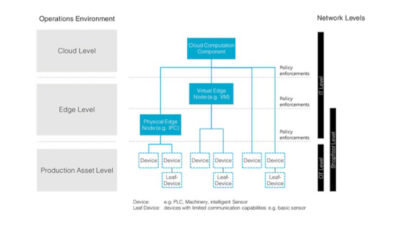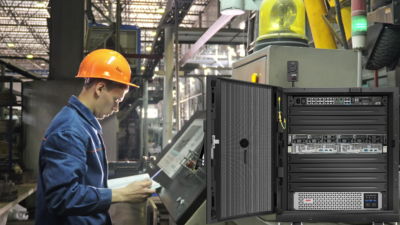Edge computing plays a significant role in enabling digitalization for industrial companies and can improve operational management.

Learning Objectives
- Understand the difference between edge and cloud computing and the role each plays.
- Learn how edge computing can improve manufacturing operations.
- Learn about edge computing cases in industrial operations and the ways it helps companies improve.
Edge computing insights
- Edge computing enhances industrial operations by enabling near real-time data processing, reducing latency and lowering bandwidth requirements.
- Implementing edge computing helps industrial companies improve sustainability, operational efficiency and address skilled worker shortages through advanced analytics and monitoring.
Industrial companies today must navigate complex challenges, but they can realize unprecedented opportunities during a time of increased digitalization. Changes brought by Industry 4.0 continue to disrupt manufacturing through the acceleration of connectivity.
The manufacturing and energy sectors have embraced this new era of digitalization and connected plant devices to improve operational efficiency and sustainability. In particular, edge computing plays a significant role in enabling digitalization for industrial companies.
All about the edge
Many think of edge computing as Internet of Things (IoT) sensor devices or smart cameras. In the industrial world, it also includes processors, universal customer premises equipment (uCPEs), servers, gateways and network routers. Edge computing empowers a framework for processing data by enterprise applications close to their data sources.
Cloud computing is a bit different. Organizations use cloud computing to process and analyze data using software on the internet from a hosted cloud provider. It offers many benefits including excellent scalability and access to connected devices from anywhere. Cloud computing also can enable centralized monitoring, analytics and benchmarking at an enterprise level. Moving all data to the cloud can be very expensive, so it requires strategic thinking while selecting cases for taking manufacturing and process data to the cloud.
Edge computing works well in industrial operations. Instead of computations taking place in a data center, edge devices can process significant amounts of data to facilitate near real-time decisions driven by data. It also ensures reduced latency and requires lower bandwidth since most of the processing happens at the edge.
Industrial IoT devices can both record and analyze data at the edge. An easy way to think about these devices is considering how consumer IoT devices operate, such as a smart watch. A smart watch can record and even analyze a fitness routine, distance covered, heart rate, oxygen levels and more on the device. Then it can send the data to the cloud for deeper analytics with other online tools.
Edge computing cases in industrial operations
Three of the most pressing issues industrial operations face today include improving sustainability, increasing operational efficiency and addressing skilled worker shortages. These important challenges continue to drive manufacturers to invest in edge computing as part of their digital transformation journeys.
In industrial companies, the push for more sustainable operations has become an increasing priority. This also extends to operations that support the energy transition with renewable energy sources, decarbonization and electrification.
For example, industrial companies may use sensors at the edge and apply artificial intelligence and machine learning to analyze energy consumption in buildings. They can then optimize the energy usage required for climate control systems so facilities consume less energy.
Additionally, some companies are using edge sensors to measure fugitive and process greenhouse (GHG) emission leaks and continuously monitor sites for emissions. Combined with an emissions management software system, edge data can enable emissions reduction strategies.
To help companies increase the electrification of their operations, edge devices in battery energy storage systems (BESS) can make better decisions about energy management to help deliver more efficient operations. BESS systems play a key role in the energy transition by enabling organizations to utilize stored electricity as demand increases without the need to burn fossil fuels.
Many organizations invest in edge computing to drive down manufacturing costs and push for more efficient operations. When industrial IoT devices and sensors record data such as raw materials and energy consumed, this data can be analyzed to produce timely production insights.
Some industries, for example, are using insights from edge devices to improve asset reliability through equipment monitoring, predictive maintenance and closed loop control and optimization. Companies also can use edge devices to build more resilient supply chains by tracking raw materials, production flows, logistics and shipping.
The shortage of skilled workers continues to be an ongoing manufacturing workforce challenge, but it’s been particularly acute in the energy industry. As more senior skilled workers retire with many years of institutional experience, organizations must transfer the knowledge to train younger field workers for many complex tasks. Connected worker solutions are using edge devices to teach remote workers how to execute field work with technology such as augmented and virtual reality (AR/VR) systems.
Edge computing guiding manufacturing’s future
For the foreseeable future, edge computing will play an important role in operations because we live in a hybrid time when not everything can be moved to the cloud. Edge and cloud computing are working more closely together to deliver powerful analytics and new operational insights. They are empowering enterprise software solutions to not only improve performance through insights, but also help organizations meet important regulatory reporting requirements.
Cybersecurity continues to be an important area. Edge computing provides better data security because it processes sensitive information closer to the source, which can also limit the exposure of certain data. In the future, deep packet inspection will be handled by edge devices to enable better connection to cloud solutions.
Over the next decade, hardware, GPUs and sensors will advance. However, edge computing will continue to play an important role in processing data to drive fast decision-making. This will drive more sustainable manufacturing, reduce operational costs, empower workers with new insights and increase organizational agility.
Sunil Pandita, vice president and general manager, Honeywell Cyber and Connected Industrials. Edited by Chris Vavra, senior editor, Control Engineering, WTWH Media LLC, [email protected].
MORE ANSWERS
Keywords: edge computing
ONLINE
See additional edge and cloud computing stories.
CONSIDER THIS
What role does edge computing play in your manufacturing operation?




